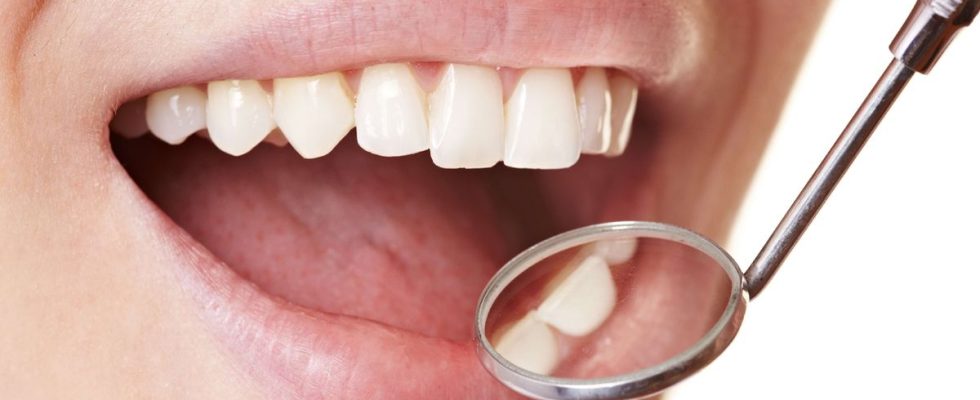It’s one of the well-being and beauty trends that’s a hit on TikTok and Instagram. And who has therefore necessarily already integrated the morning routine of Gwyneth Paltrow, chief well-being guru. Oil pulling, or oil mouthwash, is said to be the secret to a healthy mouth, fresh breath and whiter teeth. Or even more.
But what does it consist of? Is it effective and safe? 20 minutes is interested in this practice.
What is oil pulling?
Oil pulling, or gandusha in Sanskrit, is a practice from Ayurveda, traditional Indian medicine based on a holistic approach to caring for the body and mind. This involves practicing “cleansing the mouth with oil” daily, describes the Charaka Samhita, an ancient medical treatise considered one of the founding texts of Ayurveda. “Oil pulling helps cleanse the mouth of bacteria that have a bad impact on the functioning of our body,” adds Claire Nouy, co-founder ofNubio Workshopholistic beauty and wellness brand and author of My morning routines (ed. Marabout). The mouth is connected to our digestion and our immunity, which is why it is crucial to take care of your oral microbiota.”
The goal of oil pulling: to help detoxify the body and improve its oral and general health. A precept defended by Dr. Bruce Fife, nutritionist and naturopath author of The oil pulling method, To detoxify and heal the entire body thanks to a healthy mouth (ed. Eyrolles) and around twenty works dedicated to the health benefits of coconut. “Our oral cavity is home to billions of bacteria and microbes, some of which are harmful,” he explains. The “loving” oil dislodges these unwanted guests.”
What ritual should you adopt for optimal use?
“Oil pulling is done in the morning when you wake up, after using your tongue scraper and brushing your teeth with a natural toothpaste. Among the vegetable oils that can be used, those of sesame and coconut are the most indicated, for their antiseptic, anti-inflammatory and whitening properties, explains Claire Nouy. In practice, I use coconut oil, and it’s something that I’ve integrated into my morning routine for a long time. Simply take a tablespoon and make a mouthwash with it, circulating the oil well throughout your oral cavity. Ideally, it should last long enough for it to be effective: between 10 and 20 minutes. You can easily do it during your shower, for example.” In the meantime, the oil emulsifies with saliva and its texture changes. And in the end, you should definitely not swallow this mixture loaded with all the bad bacteria that has been dislodged. We spit out the oil [plutôt à la poubelle que dans son évier pour ne pas le boucher]. And rinse your mouth with lukewarm water.
A fan of yoga and numerous Ayurvedic precepts, Claire Nouy nevertheless recognizes that “this practice, which is a very effective purifying ritual for better oral hygiene, is quite restrictive. It’s not easy to stick to it every day.”
What are the virtues of oil pulling?
Claire Nouy assures her, the oil pulling method “has many virtues: teeth are smoother, breath is fresher. This provides a very pleasant feeling of having a cleaner and healthier mouth. And the beneficial effects are felt even on digestion, which is more efficient. And after about a month of practice, I noticed that my teeth were whiter. It’s great if you want to whiten your teeth naturally, without resorting to traditional whitening which is quite aggressive on the enamel.
And according to Ayurvedic principles, oil pulling has a thousand and one virtues. “I can no longer count the testimonials that praise its effectiveness for teeth whitening, the disappearance of dental plaque, the relief of inflammation and the disinfection of the gums, the overall state of health of the mouth,” explains Dr. Fife . It is also a real protective filter against a number of chronic diseases and other health problems such as migraine, diabetes, constipation, bad breath, cavities, eczema, chronic fatigue, sinusitis or even premenstrual syndrome, he lists. “If the oral cavity is a window into a person’s health, then it is conceivable that the oil could have an effect on their overall health,” says Dr. Fife.
What do dentists and Science think?
“I see a lot of posts on social media touting oil pulling as a way to remove tartar, but that is not the case, and there is no evidence to support the effectiveness of this technique,” says Dr. Nathalie Delphin, dental surgeon and president of the Union of Women Dental Surgeons (SFCD). I therefore see no point in this practice, which constitutes a fairly time-consuming additional act to add to one’s routine, when many already do not brush their teeth enough. It can even be dangerous if some people think that it can replace brushing their teeth. The dental plaque, which will become tartar, is stuck to the tooth, and only mechanical brushing can remove it.”
However, in a study published in 2016 in the Journal of contemporary dental practice, a team of Indian researchers evaluated the effect of coconut oil mouthwashes on the number of Streptococcus mutans – the main bacteria involved in the formation of dental caries – in saliva and compared its effectiveness with that of mouthwash with Chlorhexidine, an antiseptic solution. They observed a significant reduction in the number of S. mutans in both the oil pulling group and the chlorhexidine group. A result allowing researchers to consider oil pulling as “a safe and effective alternative to chlorhexidine”.
A relatively uncommon practice, “oil pulling can, however, be a relaxing ritual, part of Ayurvedic medicine which is focused on well-being,” agrees Dr. Delphin. And as such, for people who have the time, and in addition to basic oral hygiene, why not: this practice has no particular benefit for oral health but it is not not dangerous. However, this should not replace the essential ritual of brushing your teeth two to three times a day and interdental cleaning in the evening, which are essential.”

